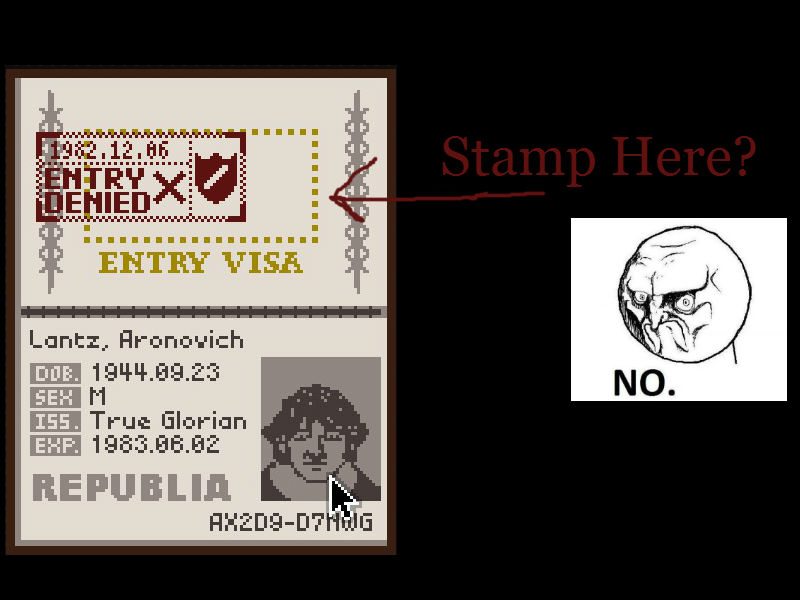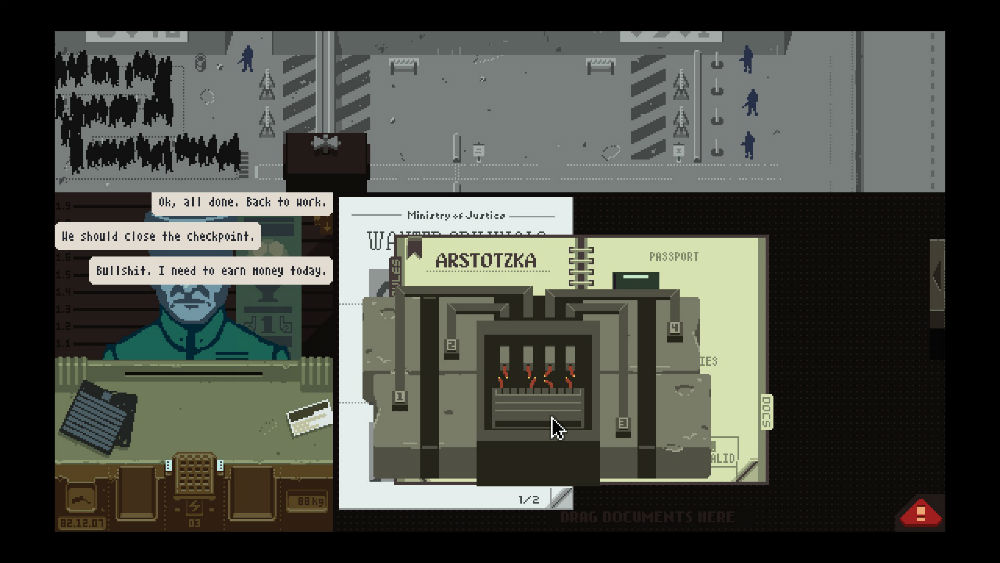Lucas Pope wrote and coded Papers, Please. In this position of supremacy he calls his creation a Dystopian Document Thriller. In the game, the player assumes the role of immigration inspector in the soviet-like postwar state of Arstotzka. Under the direction (and watchful eye) of the Ministry of Admissions the player determines which individuals from neighboring states can and cannot enter. This assessment is accomplished by cross-referencing the information on passports with those of work permits, diplomatic seals, identification cards, entry permits, admission tickets, or any other documentation that the MOA demands, often changing the requirements on a daily basis. Do well, and you are paid well. Do poorly, and you may soon find yourself on the other side of that counter… or worse.
Intrinsically, I should hate Papers, Please. Every fiber of my body should convulse against a game whose mechanics operate solely on examining and shuffling papers in a cramped booth. Paperwork is the bane of my existence (along with parking garages and stepping in dog shit). Any paperwork pushed in my direction is completed (maybe) with a snarl on my face. But, I don’t hate Papers, Please. The game is a bittersweet table-turner for anyone who has ever been jerked around at the BMV or, heaven for bid, a border station. Armed with a green APPROVED stamp and a red DENIED stamp, you are a decider of fates. I may or may not derive tremendous satisfaction when I deny a hopeful entrant and see him sulk away into the shadows and walk out of my booth through the same door in which he entered.

But, this is only the surface appeal; the game would otherwise flounder and perish. Papers, Please moves on deep currents of political intrigue. In the storymode, your stamps create narrative ripples (be sure to read the headlines!). During the course of the 30-day storyline, you can experience as many as twenty different endings. Your existence is layered. You may become entangled and associated with a group of radicals without even knowing it – but when you discover this it’s too late to back out. So you must manage your own lucrative intrigue under the nose of MOA, who may very well be involved in its own shady deals, in which you, as worker, are a pawn. As the days press on, other government agencies start stepping on your toes, thereby increasing the difficulty of your juggling act. The Ministry of Information is always sniffing around, rooting out bribe-takers; the Ministry of Justice posts their international ‘Most Wanted’ list on a daily basis, expecting you to cross-check mugshots; higher level MOA directors are monitoring your citation count; the checkpoint guards are getting on your case about the lack of detainees you send their way; political extremists are plopping bombs on your counter instead of paper work. And on top of all of this: you’ve still got crotchety old women trying to muzzle their through with expired passports.
In order to progress you need to develop a methodology and adapt it to the ever-changing daily rigors of working in an Arstotzkian immigration checkpoint. With all of the narrative entanglements, you need to walk a razors edge if you want to keep ahead. And this is all done under a constant time crunch; that clock in the lower left is always ticking. The more individuals that approach your bench, the more you get paid – and, by golly, money is tight enough as it is. Oh, and you’ve got a family to feed, keep warm and healthy.

Papers, Please itself successfully walks its own razors edge. It creates a claustrophobic, time-crunched workspace but doesn’t recreate your mundane cubicle. The antiquated graphics are stylish yet functional (you try discerning the intricacies of 8-bit fingerprints with 10 seconds left of the work day). The game doesn’t take itself too seriously but isn’t gimmicky. It is tremendously challenging but fair. Indeed. Time is short – Act fast. Glory to Arstotzka!
Great review. I’ve heard a lot about this game, I just haven’t found the time to give it a try.
It sounds like another game I tried a few months ago: Cart Life. It has that same gloomy, “you want to eat, do this mundane thing” kind of feel. I should probably play a little more of that and do a similar review.
I wonder if it’s by the same guy. Sounds vaguely familiar.